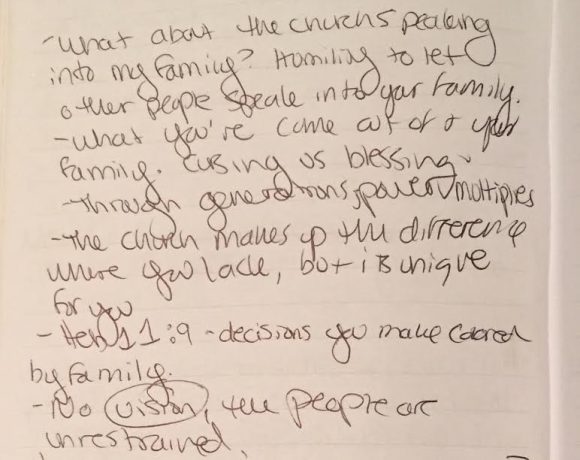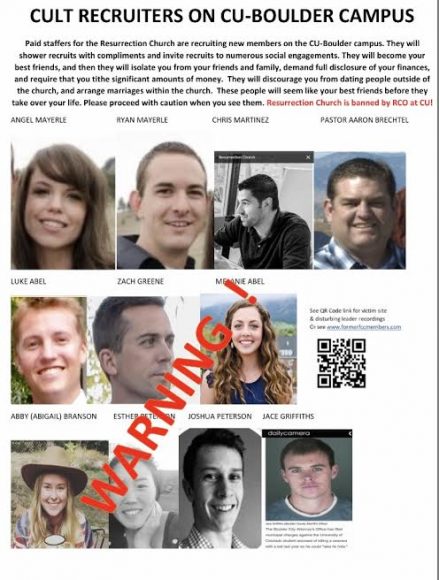
Melanie Coletta (now Abel) with her father John Coletta in 2005. (Courtesy John Coletta)
After former members spoke to the CU Independent about their experiences with the Resurrection Church in Boulder, families of current members from both the Resurrection Church and the Grace Christian Church in Fort Collins spoke out, claiming the organizations severed their relationships with their children.
John Coletta, father of current Resurrection Church member and former CU Boulder student Melanie Coletta (now Abel), has dedicated much of his time to exposing the church’s unusually extensive involvement in members’ lives — what he calls “tactful manipulation” and “spiritual abuse.”
His opinions have formed throughout his daughter’s decade-long membership with the church and his gradual loss of contact with Melanie, who spent much of her college career at CU Boulder as a member. Melanie is now married, and Coletta considers her marriage to be an arranged marriage orchestrated by pastors.
Parents of members in both churches told the CU Independent that their children are experiencing financial coercion through church membership. Their complaints mirror experiences ex-members of Faith Christian Church voiced to the Arizona Daily Star in 2015. Based in the 1970s in Florida, the umbrella group Maranatha Christian Ministries, from which the Faith Christian Church developed, primarily sought out college students but was criticized by former members for its authoritarian leadership structure and causing members to distance themselves from their parents.
Maranatha Churches shut down around 1990, according to an Arizona Star report. Faith Christian Church, the “parent” church to Resurrection and Grace Christian churches, is linked to Maranatha. Faith Christian was also accused of cult-like behavior by former members who were recruited while attending the University of Arizona, the Star reported. The church was investigated by that university but continues to recruit on campus, and Hope Church, an offshoot of Faith Christian, was under investigation by Arizona State University in December, the ASU student newspaper reported. Aaron Brechtel, lead pastor of Resurrection Church, is a former member of Faith Christian Church, according to a Daily Camera report.
Stephen Hall, founder and pastor of Faith Christian Church, controversially promoted violent child-rearing practices.
Stephen Hall, preaching during a sermon.
An ex-member of Faith Christian, parents of current Grace Christian and Resurrection church members, and a former Resurrection Church member told the CU Independent that pastors are primarily motivated by financial gain.
Coletta said he felt Melanie isolate herself from the family slowly. He noticed several red flags that made him believe the Resurrection Church was not a church, but rather a “cult.”
He said once he began to realize that it may be a “spiritually abusive” ministry, his daughter had already decided to fully “devote” herself to the church.
Through multiple conversations with Melanie, Coletta became increasingly alarmed. She brought up the possibility of switching from her family medical insurance policy to the medical insurance plan of the church and opening up a bank account so the church could have her financial information. While she was still a CU Boulder student, Coletta said his daughter gave up her passions and changed her major to something she had never expressed interest in before, communications.
He explained he would offer to financially support her passion for horses, but after initial excitement, she would decline.
“You could tell she was checking in with the pastor,” Coletta said. “Anything that’s from the parents or by the parents is attachment, and [the church] doesn’t want that.”
Eventually, Melanie moved into the basement of Resurrection Church pastor Brechtel’s house, and stayed for two years even after her father had offered her full-use of their family’s 6 horse, 2 acre barn home in hopes of deterring her from the church.
Coletta’s skepticism grew following a conversation with another parent, who had had a child in the Resurrection Church for years.
“‘Your daughter is one of these basement girls? She’s just going to be married off, and you are going to lose her,’ another parent told me,” Coletta said, recounting the conversation.
Coletta said he learned the pastors “cycle” girls into the basement living arrangement to disciple them. He explained that discipling consists of lecturing girls, requiring them to do house chores and charging them rent.
Lois Kluge, a parent of a current member in Grace Christian Church, said the discipling process is to tire them, so they feel agreeing to marry male church staffers and other male members is their only option.
“It’s the way they get them down, tired, and exhausted and relying on them, ultimately to marry them off,” Coletta said. “All basement girls are married off.”
Former members Conner Dudrey and Trevor Sweet also told the CU Independent they felt isolated during their membership with the church and that members’ contact with others is mostly with other church members. Melanie married someone who was also a church member, her father said. Another member, Esther Peterson, who was “discipled” alongside Melanie in Brechtel’s home, also married someone in the church as she moved out of the pastor’s living arrangements, Coletta said.
Jeremy Morgan, former college campus pastor for Faith Christian Church in Arizona, said while he was a member, his marriage was “more or less” an arranged marriage. After both of them left the church, they divorced.
After explaining his ex-wife was living in a room in the house of one of the pastors learning how to be a homemaker in a “Christian household,” he said the living situation was exhausting for her.
“The only way out of this living situation is to get married,” Morgan said about his ex-wife’s thought process.
Eventually, after Coletta had completely lost contact with Melanie, he felt as though he had nothing to lose anymore and went to take the car Melanie usually drove because it was registered in his name. Inside of the car, he found a diary and a financial statement showing how much money she was making to work at the pastor’s home and how much went to the church.

Financial statement showing Melanie Coletta’s total contribution to the Resurrection Church, including her parsonage (or housing funds), income and insurance fees. (Courtesy of John Coletta)
“[It’s] about two times what I would expect it to cost a normal company,” Coletta said in reference to the health insurance fees.

Note from diary of Melanie Coletta. Reads as follows: what about the churchs peaking into my family? Humility to let other peoples peak into your family. What you’ve come out of + your family. Cursing vs blessing. Through generations power multiplies. The church makes up the difference where you lack, but it is unique for you. (Courtesy John Coletta)

Reads as follows: This is how you have confidence, is “how much did I love the church?” (John Coletta)

Reads as follows: I want to see a whole lot of captive people in Boulder restored from oppressed to set free! (Courtesy John Coletta)

Reads as follows: I have authority from God to break through the demonic. Truth and faith is how you break through. What is true and how does the Lord see what He has called me to do? The demonic has no authority over me. Keeping joy is having authority. Keeping in joy will give me the strength to have authority over the demonic. (Courtesy John Coletta)

Reads as follows: Wedding date, figure out budget — call + talk to my dad — what would our budget be? Next week — no strings attached. (Courtesy John Coletta)
Coletta said Melanie’s diary mostly alludes to the church’s teachings of a “war on demons.” These “demons,” the church believes, are all non-members of the church. He also said the entry in which she mentions calling him for her wedding budget and writes “no strings attached” meant she wanted to remind herself that the conversation with him would solely be to get money for her wedding, but not to build any further relationship with her father.
After the Daily Camera published a report in August 2016 about the Resurrection Church that featured multiple CU students and former members, Coletta became extremely alarmed and decided he needed to call the pastor, Brechtel.
After once being assured by Brechtel in person that parents were welcome to call anytime with any concerns, Coletta was taken aback when Brechtel disregarded his multiple contact attempts. He believes Brechtel blocked his number.
Coletta said he thinks that churches like Resurrection Church arise when pastors seeks power and financial gain. Many churches across the country squash suspicions of unethical financial practices by joining the Evangelical Council For Financial Accountability. According to Nicole Wallenfelz, ministry relations associate for the council, the Resurrection Church has never joined the EFCA. She also said ministries voluntarily join the ECFA, but all members’ finances are reviewed in accordance with standards that the council sets.
“If the IRS audits them, that’s their Achilles’ heel. They will fall,” Coletta said.
Most churches are tax-exempt, as they are considered non-profit organizations. The IRS will only perform audits on churches if there is reasonable belief suggesting that an organization claiming to be a church does not qualify for tax exemption.
IRS representatives did not respond to multiple contacts from the CU Independent, but the IRS website allows anyone to file a tax-exempt organization complaint form. Form 13909 lists criteria that the complainant can mark, such as “Directors/Officers/Persons are using income/assets for personal gain.” Coletta and other parents have said they believe pastors from the Resurrection Church, Grace Christian Church and Faith Christian Church are using financial income from church members for their own personal financial gain.
“The IRS has been really ‘gun-shy’ to audit churches,” Coletta said.
The tax-exempt status of the Church of Scientology, which is widely criticized as a cult and abusive, was revoked by the IRS, which deemed it a commercial enterprise, from 1967 to 1993. The organization regained its status after bringing thousands of lawsuits against the IRS.
Aaron and Julia Brechtel own a home in Longmont they bought for more than $400,000, according to Weld County Property Records. However, Coletta says Melanie has spent a lot of time on a ranch in Colorado with the church, as well as time on multiple properties in Fort Collins that he assumes are tied to leaders at either Grace Christian Church or Resurrection Church. According to state and county records and the Arizona Daily Star, Faith Christian Church’s assets value around $5 million, including a ranch and two cabins.
In 2015-2016, Resurrection Church rented their New Vista High School meeting space in Boulder for around $1,526 a month, according to the Daily Camera, but does not own a church building. According to former member Aaron Aragon, the church used to meet in the Hale Science building on the CU campus, until it outgrew the venue.
Another Fort Collins parent who chose to remain anonymous to preserve what is left of their relationship with their child also said they believe the motives behind the sister-churches may be financial. They said all members are coerced into giving a minimum of 10 percent of their net income in tithe. Their child is a member of Grace Christian Church.
“All I see are dollar signs for [the pastor]” the parent said.
The parent said they believe there are clear differences between healthy churches and the Resurrection and Grace Christian churches. Although it is common for churches to tithe 10 percent and ask for financial contributions from all members, the parent says that’s considered normal when a church does not control every aspect of a member’s life.
The parent continued, saying the constant “pressure” for money is not present in “healthy” churches because “healthy” churches ask for contributions in tithe but recognize that not all members can contribute the same amount.
Additionally, many churches use donations for outreach to the community by running charity projects and mission trips. An anonymous former Resurrection Church member said outreach is not a part of the church’s activities. She said that after leaving Resurrection Church, she joined a church that was active in financially and physically helping struggling, local communities like the Boulder homeless. Members said the monetary coercion they experienced contributed heavily to the spiritual abuse they said they felt.
The anonymous parent also said many churches use donations for the upkeep of their buildings, but neither Grace Christian Church nor Resurrection Church have designated church buildings except for spaces they rent for service meetings.
“If something feels wrong about a church, and the consensus among former members is that it’s wrong, then it is wrong,” the anonymous parent said, after saying they believe the churches maintain a firm control on members and ultimately dictate their lives and finances.
Morgan said he believes that none of the ministers or pastors have seminary training or a theological degree, which is atypical for church officials. He said he suspects that higher-ups in the church are making a lot more money than most church pastors do.
“When 80 percent of people who are attending your church are donating 10 percent of their gross yearly income to the church, and you don’t have [your own] building you have to pay for or a mortgage, and you are able to rent school facilities, you got a lot of extra cash for being a non-profit,” Morgan said.
Another ex-member spoke to the CU Independent about her membership with Resurrection Church, but cited her fear of coming forward with her identity.
“I am scared of what people in the church might do,” she said when asked why she wanted to remain anonymous.
However, she said she is unsure if the motives behind Resurrection Church are solely financial.
“I am not sure if they believe they are genuinely doing the right thing, or if they have an ulterior motive,” she said.
At one point, she compared the pastors and ministers to robots, saying that while attending church, she thought the pastors were “speaking in tongues.”
She left due to severe personal issues, but cited the heavy pressure from the pastors to leave her significant other at the time as a reason for her departure.

A flyer made by John Coletta warning students about the Resurrection Church. (Courtesy John Coletta)
In efforts to deter other students from joining the church, Coletta has created a website and the flyer depicted above showing the pastors of the church. He plans to display the flyer around the CU Boulder campus.
The poster cites the Religious Campus Organizations, led by pastor Zach Parris. The organization oversees campus ministries at CU Boulder. It removed the Resurrection Church as a member due to “repeated violations of the code of ethics.”
“Where we had some issues [with Resurrection Church] was around honoring human dignity,” Parris said. “Part of the standards that you are held to when you are a member of the RCO is that you recognize the students’ abilities to make decisions for themselves.”
He said a student committing suicide at CU back in the ’90s, over a decade before Resurrection Church was founded in Boulder, led to the formation of the RCO, in order to enact a code of ethics that all campus ministries could comply with if they wanted to be a part of the organization.
“When folks joined [Resurrection Church], they were really encouraged to cut off relationships with members outside of their community,” Parris said.
Resurrection Church did not respond to several contact attempts from the CU Independent.
The CU Independent also spoke to Ryan Huff, spokesman for CU Boulder, about whether the university should do have a role in raising awareness about the Resurrection Church.
“We know our students have a lot of off-campus interests, from faith-based organizations to skiing and cycling,” Huff said. “We as a university do not have say over what our students do off campus. So there’s no jurisdiction for us to take any official action. Any organization has free speech rights to distribute information on campus. We need to treat everyone equally.”
Contact CU Independent News Features Editor Charlotte Bowditch at charlotte.bowditch@colorado.edu.
